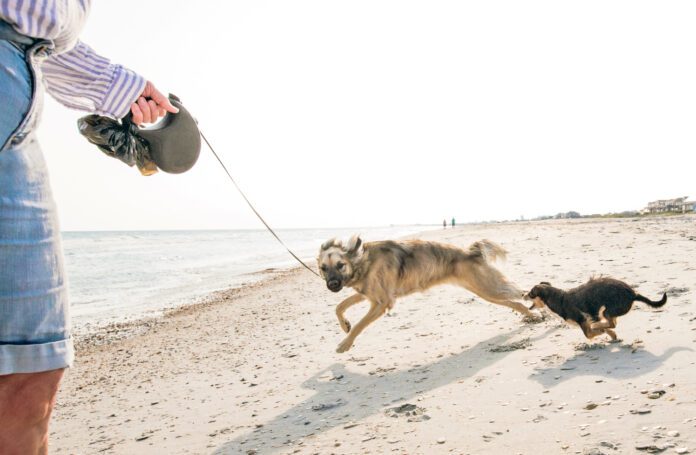Here’s the thing that the various makers of retractable leashes don’t want you to know: They can hurt you – and your dog – and the bigger the dog and retractable leash, the more likely the chance of injury.
Does that mean retractable dog leashes are bad and unsafe? We think so.
Common Retractable Leash Injuries
There are two main ways retractable dog leashes can hurt you. The first is the whiplash effect that’s caused when your dog reaches the end of the 16-foot line (or 26-foot line) at full speed. The force of that sudden deceleration can crush your dog’s larynx, bruise or strain the muscles in his neck or chest, or badly hurt you – from whiplash to fractures, depending on whether you fall down or not.
And, if you manage to drop the retractable leash, that heavy handle you hold on to will whip its way back to the dog, potentially injuring the dog or scaring the dog – especially a puppy! – enough that the dog takes off running only to be “chased” by the leash.
The second kind of injury is caused when that long leash wraps around something, like a person’s legs, which may cause that person to fall. And if that person isn’t related to you – well, get ready for the lawsuit. That’s why they aren’t allowed at some veterinarian’s offices, stores, and at many dog events.
Too often, dog owners either willfully or absent-mindedly don’t pay attention to what their dog is doing at the end of their 16-foot retractable leash, and so the dog gets in a fight with another dog or wraps his leash round a person’s leg or an immovable object and trips someone. That’s why some communities have banned them completely. It’s why Mounds Pet Food Warehouse of Wisconsin banned them at its five stores.
Walking is great exercise for you and your dog. The purpose of retractable leashes is to give your dog more freedom to roam and explore, but doing it safely requires proper walking training and great care. That’s why most dog trainers and animal behaviorists recommend using a standard six-foot leash to walk your dog.
Statistics on Retractable-Leash Injries
From 2001 to 2018, the American Journal for Emergency Medicine tracked injuries requiring emergency room treatment related to retractable dog leashes, and they found those injuries increased by four times. Of those, 193,000 were from pulling and 136,000 were from becoming entangled. The most common injuries were fracture, strain or sprain, or contusion, usually from the leash breaking.
On his website, Dr. Garret Pachtinger of Philadelphia, a board-certified emergency/critical care veterinarian and the co-founder of VetGirl, a continuing education site for veterinarians, says the most common injuries he sees from retractable leashes are a neck strain or a displacement of a vertebra from the dog suddenly pulling hard and fast, or a variety of injuries when a person falls because the leash has wrapped around their leg(s).
Dogs can also suffer eye injuries if the leash breaks; they can suffer torn larynxes from pulling too hard; dogs have jumped to their deaths or run into traffic after pulling the leash from their handler’s hand and then fled blindly in terror because they thought something was chasing them.
If you must have a longer leash for your dog for a particular outing or event, buy a long-line regular leash, not a retractable. “It takes some skill to manage long and light lines without turning them into a knotted mess, but it’s worth the effort,” says Whole Dog Journal Training Editor Pat Miller. You need the right leash for what you are doing with your dog.






